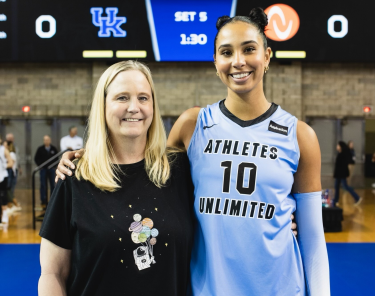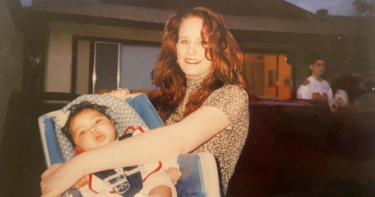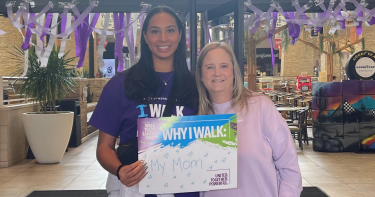
Having been diagnosed with lupus over 20 years ago, Kristine Falk occasionally had to call in sick to work due to her lupus symptoms. But on a fall day in 2011, she was off work for a different reason: to support her daughter, Kaz Brown, who was a sophomore playing in the high school volleyball state tournament. Not only did Falk watch the game, she was captured in a photo cheering from the stands, which appeared on the front page of the local newspaper the next morning.
“I still very much have the present mother that I had as an eight year old when I was playing volleyball for the first time versus now when I’m in my seventh year as a professional,” said Brown, 28, who plays for the Orlando Valkyries of Athletes Unlimited, a professional sports organization that focuses on women’s professional sports. “Every time I looked out in the crowd, I had a familiar face.”
“Mother’s Day can be a great opportunity to offer something special to [a loved one],” said Jodie Nimigon-Young, a registered social worker and lupus warrior. “Sometimes that can be doing activities traditional to Mother’s Day, and sometimes activities which offer a distraction, particularly for those who have struggled with fertility, can also be just as valuable.”
For those who grew up with a mother living with lupus, Mother’s Day can carry a different kind of meaning—one shaped by early memories of resilience and quiet strength.
“She took the challenge of the diagnosis head on, and was like, ‘I’m gonna fight this and do what I can to be present for my kids,’” Brown said. “[My mom’s] selflessness is something that I want to embody more.”
It can be difficult for young children to understand and cope with the challenges a loved one faces while living with lupus — something Brown remembers from her own childhood. Her mother was often in and out of the hospital, and while Brown recalls many joyful moments, she also now recognizes how much her mother tried to shield her and her siblings from the full reality of her illness, which included hiding her fatigue, the number of medications she was taking and the frequency of hospital visits.

“Try to hold in mind that you are also there for your loved ones in the ways you can be there for them,” said Dr. Nicoletta Skoufalos, a clinical psychologist. “Just because you have lupus doesn’t mean that you can’t help loved ones when they need help. You can listen to their struggles, offer advice and support.”
When Falk was diagnosed with lupus, she was raising four children: nine-year-old twin boys, an eight-year-old daughter, Brown, and a two-year-old daughter. Looking back, Falk has since shared with Brown that she wishes she had been more open and honest with her children about what she was going through. Nonetheless, managing conversations about a lupus diagnosis with young kids can be incredibly difficult for parents, who are often still processing the diagnosis themselves.
Despite the challenges her family faced, Brown treasures the strength and steadiness her mother has shown throughout her battle with lupus. Looking back, she is especially grateful for the way her mother prioritized her children, even while navigating her own health struggles.
“When my mom was dealing with this diagnosis, she was scared and unsure,” Brown said, “but, ultimately, her number one goal was making sure that her four children were cared for. And I think that’s the definition of unconditional love.”
Falk’s deep sense of care and commitment also inspires Brown’s advocacy work. Brown works to champion and support her mother through the ‘Athletes Causes Initiative,’ a program sponsored by Athletes Unlimited where athletes select a nonprofit organization they want to support. Any monetary bonus that is earned throughout the regular season is matched and then donated to that player’s cause of choice. The ‘Athletes Causes Initiative’ also allowed Brown to connect with her mother regarding the lupus diagnosis.
“As a child of a parent with lupus,” Brown said, “anything that I can do to raise awareness is super important because I still meet people every day who have never heard of lupus, or don’t necessarily understand what it is and how it affects people worldwide.”
But raising awareness goes beyond fundraising—it also involves dispelling common misconceptions about autoimmune diseases.
“Not all autoimmune diseases have a ‘look,’” Brown said. “What could be hard for people who don’t know a lot about lupus to understand is it doesn’t necessarily always come with an outward appearance.”
Awareness can also develop within the household. Families that have a parent with lupus often develop communication strategies that help navigate the unpredictability of lupus flare-ups with understanding and flexibility.
“When it comes to lupus, things change all the time,” Dr. Skoufalos said. “You may have plans to do something and then a flare may emerge and you may have to cancel. It is important to simply state this if a flare emerges that throws a wrench in your plans.”

And while navigating lupus can be difficult, there are many ways to make time to celebrate on Mother’s Day that accommodate the energy levels and health needs of someone with lupus.
When Brown and her siblings were growing up, Mother’s Day was filled with traditions to honor Falk: letting her sleep in, making her breakfast in bed and surprising her with a fruit bouquet.
Now, as adults spread across the country, the family marks the day with a group FaceTime call or, when possible, by coming home to celebrate together. No matter how the tradition evolves, the aim of the day remains the same: showing unconditional love, appreciation, and support in ways that matter most.
Supporting a Mother with Lupus: Additional Tips for Families and Communication Strategies for Those Living with the Disease
- It is important for a mother to be open with her children about having lupus in an age-appropriate manner and expanding the information and details that are shared as children age.
- A good way for children to show their mother who lives with lupus some support is to express excitement about engaging in activities with their mom that they know their mother is capable of doing. This can help the mother feel like their child enjoys spending time with them regardless of the activity, and it acknowledges the mother’s abilities and limitations in a way that can help their mother feel seen and understood.
- There is no right answer to good communication while living with lupus, except generally more communication is always better, while being open to hearing your spouse and children’s experience as well.
- Lupus patients tend to judge themselves when symptoms worsen to the point of impacting their daily tasks, even years after initial diagnosis. Open communication is key, even prior to a full flare.
- A helpful strategy for communicating one’s needs is to acknowledge upfront that you are aware that you are asking for something and that it has an impact on others. Make sure to also express gratitude for any help provided. For example, one could say, ‘I know you just made dinner for me yesterday and I really appreciate it. Would it be possible to make me a meal again today because I am not feeling well again. I know it’s a bit time consuming and I want you to know I really appreciate your care.’
- Ask for different types of help from different people if possible. Try to spread around the requests so that you don’t feel like you are always asking the same person.
- Remember to hold in mind that you are asking for help, you are not making a demand. It is important to hold in mind that loved ones are allowed to say ‘no’ to the person living with lupus. They’re choosing to help you. It also is reasonable that family members will get tired or frustrated at times, but this is normal and does not mean that the person living with lupus is a burden.
- Assistance can take all forms: completing household chores (like laundry or meal preparation); help with childcare; financial assistance or transport; accompaniment to appointments, and even showing support by attending advocacy & fundraising events.
- Having various activities in your backpocket for low energy/high symptoms times, to quickly substitute is a great strategy; as well as having other family members who could do the previously promised (likely high energy) activity with your children.
- Building a routine as a family which is sustainable, with prevention in mind, is a great starting point. The hardest part can be changing plans with young children, who have greater difficulty when routine changes and/or when promises are broken.
Authored by:
Ian Decker
This blog post and the lupus resources found on the National Resource Center on Lupus are, in part, supported by the Centers for Disease Control and Prevention under Cooperative Agreement Number NU58 DP006139. The contents are solely the responsibility of the developers. Points of view or opinions do not, therefore, necessarily represent official views of the Centers for Disease Control and Prevention or the Department of Health and Human Services.
This blog post is for educational and information purposes only. Consult with your doctor/health care team for medical advice.
This post was originally published on this site
